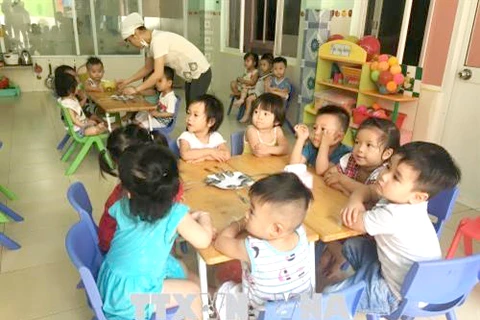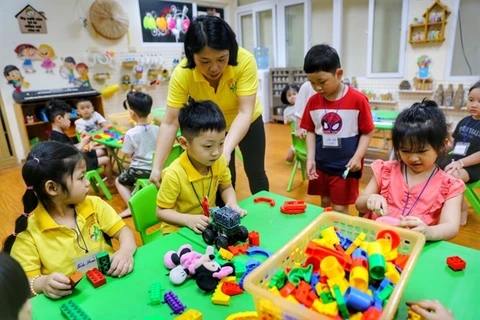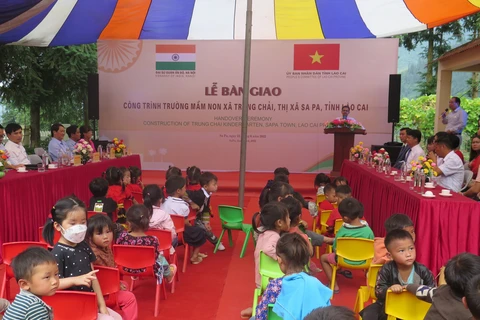Hanoi (VNA) – Vietnamese and foreign experts shared experience in childhood education in order to build a new pre-school education programme during a conference held by the Ministry of Education and Training on November 22.
The experts discussed various issues related to the enhancement of education quality and scientific research activities. They covered support policies and working conditions for teachers, investment in infrastructure, and the provision of education access for children in difficult areas and industrial parks.
Phil Lambert, Adjunct Professor at the University of Sydney said that there are five main principles in maintaining the quality of childhood education, firstly the exploration and evaluation of the relevant ecosystems, including all factors inside and outside the pre-school service system.
The curriculum must strike a balance during the early years of learning, he said.
The pedagogical training method must be associated with practicing activities. In addition, it is necessary to assess the progress of each child's ability, progress, strengths, and areas for improvement, said Lambert. He also stressed the significance of result monitoring and evaluation.
He held that in order to ensure successful innovation of education programmes, it is necessary to ensure the quality standards, and those standards need a framework comparable to global best practices in terms of curriculum, pedagogy, assessment and self-assessment.
He pointed to the need for close supervision and the participation of society, not just those working in the industry. He also noted smart investments to improve the position of the teaching profession and enhance the professional qualifications of teachers.
 The conference draws a large number of domestic and foreign experts as well as representatives of localities (Photo: VietnamPlus)
The conference draws a large number of domestic and foreign experts as well as representatives of localities (Photo: VietnamPlus) Meanwhile, Dr. Aija Rinkinen, a senior education expert from the World Bank in Malaysia who used to work in the Ministry of Education and Culture of Finland, shared the European country’s experience in the field.
She highlighted the content of the training programme and the structure of early education must reflect changes in society. They should include qualified human resources, more research and the application of knowledge gained from research activities to curriculum building. Future assessment should form a basis for programme development, and the building of a common understanding of the professional competencies required in childhood education. It is important to have coordination among all stakeholders, she said.
Participants agreed that the education programme should pay greater attention to specific groups, such as poor children, children of workers in industrial zones or those in difficult mountainous areas.
Addressing the event, Minister of Education and Training Nguyen Kim Son hailed the experts’ ideas, which are helpful for Vietnam in building the new childhood education programme.
He said that during the design of the programme, it is necessary to take into account nutritional development, mental health, social issues, and related policies. It is important to pay attention to feasibility in line with Vietnam's current conditions, as well as the special conditions of disadvantaged areas, he said.
He also underlined the need to prepare a contingent of teachers by organising training activities for teachers in over 1,500 private childcare schools across the country.
To this end, he stressed the need for pedagogical schools to "shake hands" with the programme building team to update and adjust the contents of teacher training curriculum, while proposing to the Government necessary policies for the building of the programme.
The ministry asked for World Bank’s support in training pre-school teachers.
Currently, 20% of total schools of Vietnam are in degraded condition, he noted, stressing the need for improving educational infrastructure.
The minister asked localities and departments of education and training in the next five years to focus on solidifying preschools, and preparing learning materials, equipment, and toys for children./.
























